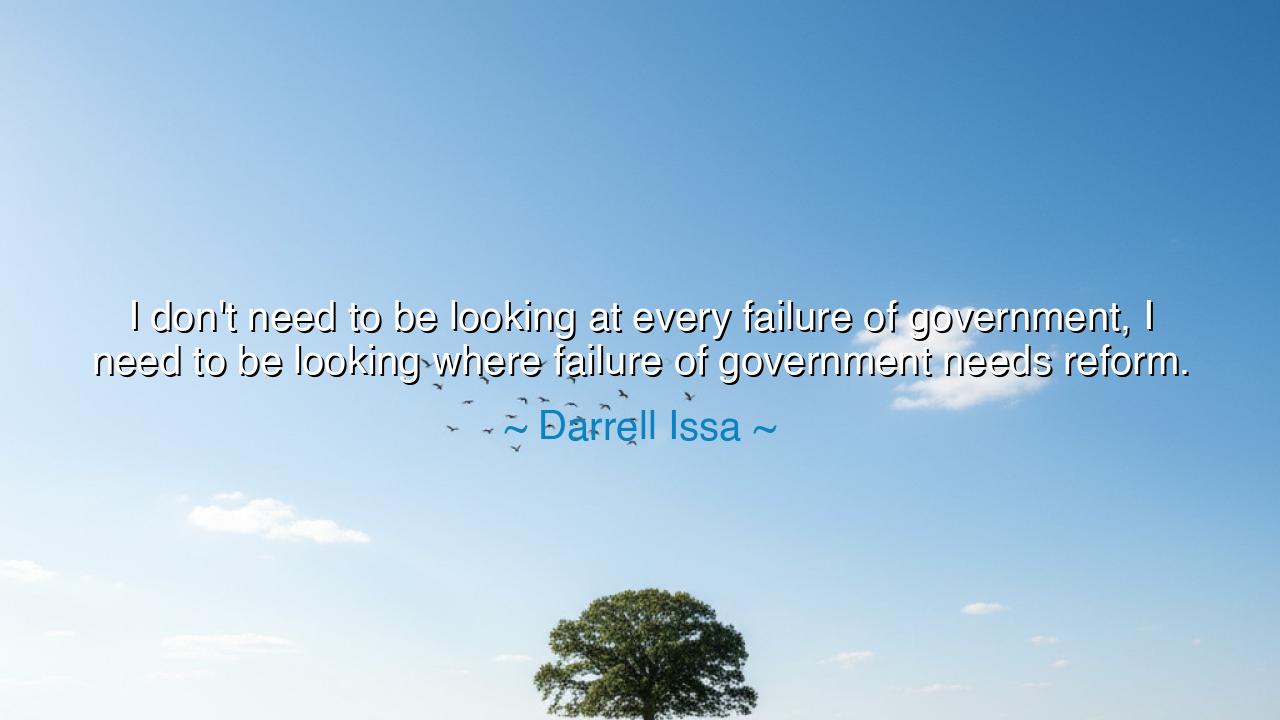
I don't need to be looking at every failure of government, I need
I don't need to be looking at every failure of government, I need to be looking where failure of government needs reform.






Host: The room is cool, the air sharp with the smell of freshly printed papers and the faint hum of a nearby air conditioning unit. Jack and Jeeny sit at a wooden table, their eyes locked in conversation, each weighed down by the gravity of what they're discussing. Outside, the city buzzes, but inside, the atmosphere is still, focused. The light from the overhead lamp casts shadows across the walls, creating a sense of quiet urgency.
Jeeny: (leans forward, voice steady) “I came across a quote by Darrell Issa today. He said, ‘I don’t need to be looking at every failure of government, I need to be looking where failure of government needs reform.’”
Jack: (raises an eyebrow, a hint of cynicism in his voice) “Hmm, so what, he’s saying we should just stop looking at the problems and focus on the solutions? Seems a little too simplistic, don’t you think?”
Jeeny: (shakes her head, her tone calm) “I don’t think it’s that simple. I think what he’s getting at is that we often get lost in the details of failure. We focus on everything that’s wrong, without asking why things are wrong and how we can fix them. The reform isn’t just about pointing out failures, it’s about understanding the core of those failures and creating real solutions.”
Jack: (leans back, crossing his arms) “But isn’t it important to understand the failures, Jeeny? How can you even begin to reform something without acknowledging what went wrong? Ignoring the failures could just lead us to repeat the same mistakes over and over.”
Jeeny: (pauses, her voice thoughtful) “I’m not saying we should ignore the failures, Jack. But when we focus on the failures themselves, we sometimes miss the bigger picture. We need to understand why the government is failing, and where it needs reform. It’s not about dismissing the problems, it’s about looking beyond them to see where the system itself needs to change. If we’re always looking at failures, we miss the opportunity to ask the right questions.”
Jack: (nodding slowly, his voice more reflective now) “So, you’re saying that we need to zoom out? To stop getting stuck in the minutiae of the failures and start thinking about the bigger structural changes that could prevent them?”
Jeeny: “Exactly. It’s about stepping back and asking, ‘What’s wrong with the system that caused these failures?’ We need to address the root cause, not just the symptoms. Acknowledging failures is important, but reform means looking for sustainable solutions, not just reacting to each new problem as it arises.”
Jack: (his voice deepens, almost defensive) “But isn’t reform just a buzzword? Everybody says we need it, but when it comes down to actually making changes, it’s a battle of ideologies. No one can agree on what needs to be done. You can’t just wave a magic wand and fix the system overnight.”
Jeeny: (smiling softly, almost sadly) “No, it’s not that simple. But that doesn’t mean we shouldn’t try. Reform doesn’t have to be some grand gesture. Sometimes, it’s about small changes in the right places, in the areas where we see consistent failure. If we’re too focused on criticizing the failures, we’ll never get to the solutions. We need to see where the system is broken and start there.”
Jack: (pauses, his voice quieter now) “I suppose… you’re right. The system is what needs to be fixed, not just the failures. It’s easy to get bogged down in all the problems without actually thinking about how to change things for the long run.”
Jeeny: (nodding, her tone softer) “Exactly. Reform is about progress, about evolving the system so that it works better for everyone. If we’re always looking at failure after failure, we’re not giving ourselves the chance to build something that’s sustainable, something that works.”
Host: The air in the room feels less heavy now, as if a subtle shift has taken place. The flickering light above them seems to soften, and the city’s hum outside fades into the background. Jack and Jeeny sit in silence for a moment, contemplating the weight of their words. There’s no definitive answer, no easy solution, but the clarity between them is palpable now, grounded in the idea that real change requires more than just reaction — it demands deep, structural reflection.
Jack: (with a thoughtful sigh) “So, it’s not about ignoring the failures, but about understanding them in a way that helps us get to the real solutions. Reform starts with knowing where to make those changes.”
Jeeny: (her smile is quiet, but genuine) “Exactly. It’s about action, but it’s also about knowing where that action will do the most good.”
Host: As the conversation winds down, the light continues to fade, leaving the room in a soft, contemplative silence. Jack and Jeeny sit in the quiet, both with a new understanding of what it means to truly address the failures that shape our world. They’re no longer just looking at the problems — they’re thinking about how to create a better way forward.
End Scene.






AAdministratorAdministrator
Welcome, honored guests. Please leave a comment, we will respond soon